Are you thinking about using bleach to pressure wash your outdoor surfaces? If so, you may be wondering if bleach can damage or kill your grass. In this article, we will explore the effects of bleach on grass and provide tips on how to protect your lawn while still achieving a clean outdoor space.
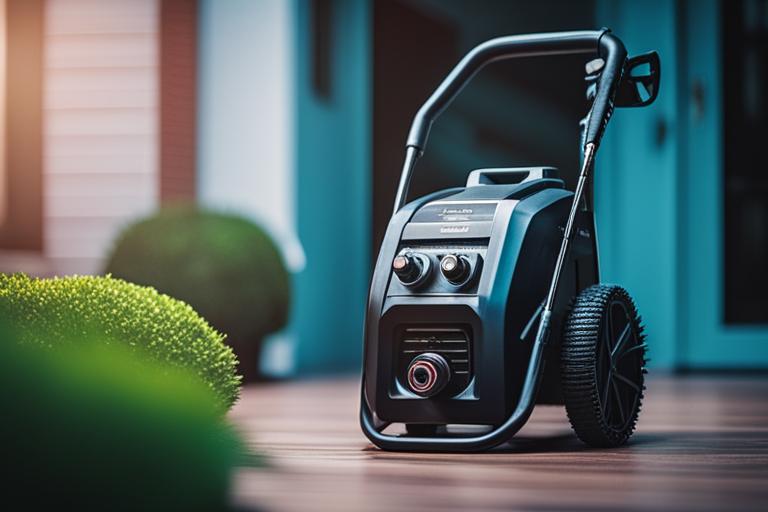
Using Bleach to Pressure Wash Grass
Learn about the effects of using bleach on grass and how to protect your lawn before pressure washing.
– Bleach can kill or cause permanent damage to grass.
– Prepare and cover your lawn before pressure washing with bleach.
– Consider using non-toxic cleaners or taking safety precautions to protect your lawn.
Understanding Pressure Washing with Bleach
Definition of Pressure Washing with Bleach
Pressure washing with bleach is a cleaning technique that involves combining bleach with water and using a pressure washer to spray the solution onto outdoor surfaces. This method is often used to remove dirt, stains, and debris from surfaces such as decks, patios, and sidewalks.
How Pressure Washing with Bleach Works
The bleach in the solution breaks down and removes organic material, such as dirt and stains, from outdoor surfaces. The pressure from the pressure washer helps to lift and remove the dirt and debris, leaving the surface clean and bright.
Why it’s Commonly Used for Outdoor Cleaning
Pressure washing with bleach is commonly used for outdoor cleaning because it is effective, efficient, and relatively inexpensive. It can quickly remove dirt and stains from surfaces, making them look like new again. Additionally, bleach is a powerful disinfectant that can kill bacteria and other harmful organisms that can be present on outdoor surfaces.
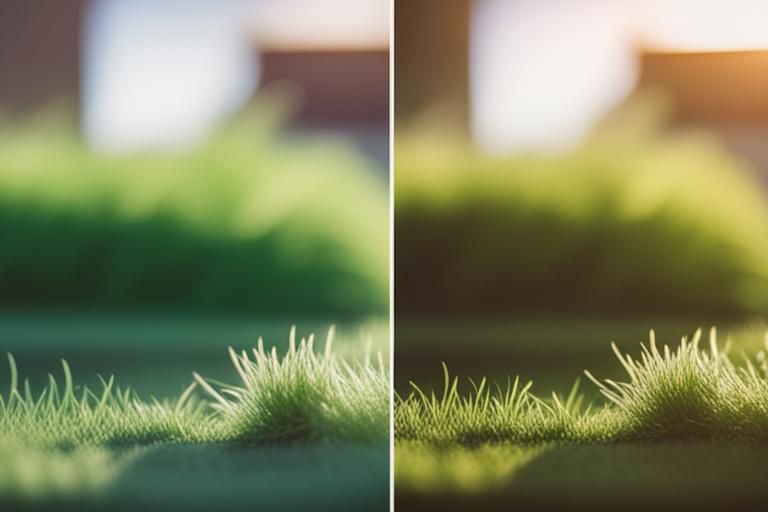
The Effect of Bleach on Grass
Understanding How Bleach Affects Grass
| Bleach Concentration | Water | Ratio |
|---|---|---|
| 100% bleach | 0% water | 1:0 |
| 50% bleach | 50% water | 1:1 |
| 30% bleach | 70% water | 3:7 |
| 10% bleach | 90% water | 1:9 |
| 5% bleach | 95% water | 1:19 |
Bleach is a highly alkaline substance that can cause damage to plant cells. When bleach comes in contact with grass, it can cause the grass to turn yellow or brown and, in severe cases, die.
What Happens When Bleach Comes in Contact with Grass
When bleach comes in contact with grass, it can cause a chemical burn on the grass blades and roots. This burn can damage the grass and cause it to become weak and susceptible to disease or pests.
Will Bleach Kill Grass or Cause Permanent Damage?
Bleach can kill grass and cause permanent damage if it is not used properly. If the bleach is too concentrated or applied too heavily, it can cause the grass to die. However, if the bleach is diluted and applied correctly, it can be used to safely clean outdoor surfaces without harming the grass.
How to Protect Grass when Pressure Washing with Bleach
Preparing Grass Before Pressure Washing
Before pressure washing with bleach, it is important to prepare the grass by watering it thoroughly. This will help to dilute any bleach that may come in contact with the grass and minimize the risk of damage.
Covering Up Grass Before Pressure Washing
Another way to protect grass when pressure washing with bleach is to cover it with plastic sheeting or tarps. This will prevent the bleach solution from coming in contact with the grass and minimize the risk of damage.
Tips to Protect Grass from Bleach
To protect grass from bleach, it is important to dilute the bleach solution properly and to avoid applying the solution too heavily. It is also important to rinse the grass thoroughly with water after pressure washing to remove any residual bleach.
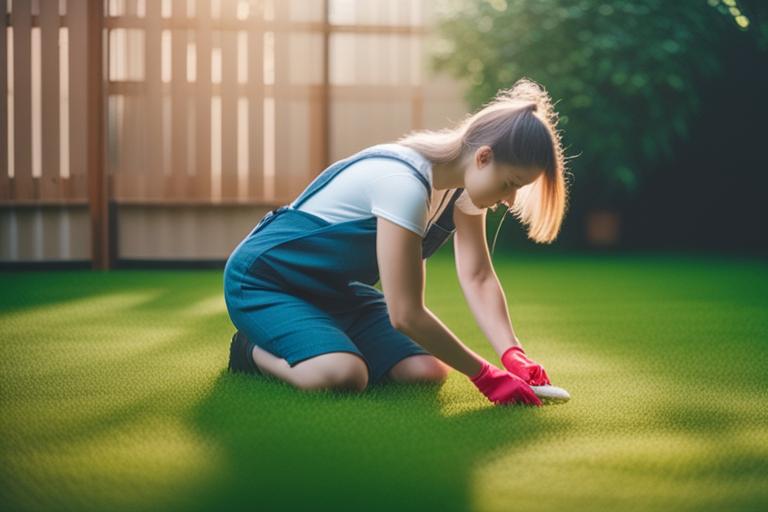
Alternatives to Pressure Washing with Bleach
Other Methods to Clean Surfaces Without Using Bleach
There are several other methods to clean outdoor surfaces without using bleach. These include using non-toxic cleaners, such as vinegar and baking soda, or using a pressure washer with just water.
Pros and Cons of Using Bleach vs. Other Cleaning Methods
While bleach is effective at cleaning outdoor surfaces, it can be harmful to the environment and can cause damage to grass and other vegetation. Non-toxic cleaners, such as vinegar and baking soda, are safer for the environment and can be used safely on grass and other vegetation.
Examples of Non-Toxic Cleaners that are Safe for Grass and the Environment
Examples of non-toxic cleaners that are safe for grass and the environment include vinegar, baking soda, and hydrogen peroxide. These cleaners are effective at removing dirt and stains from outdoor surfaces and are safe to use on grass and other vegetation.
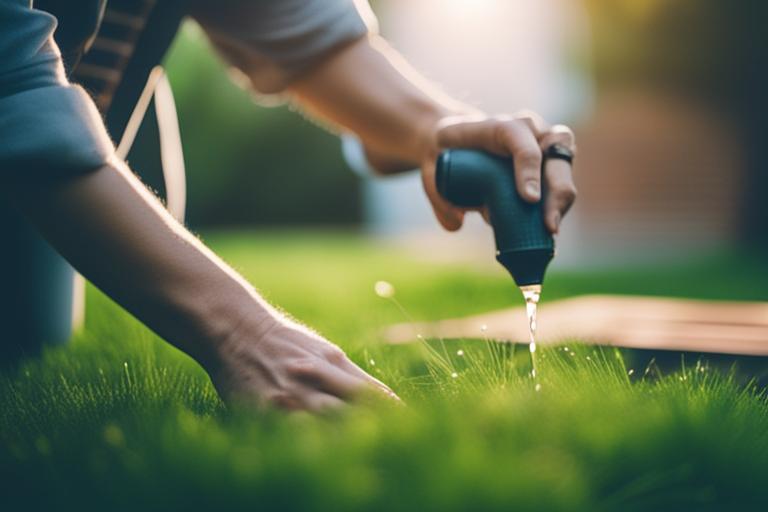
How to Revive Grass After Exposure to Bleach
Tips to Revive Grass After Pressure Washing with Bleach
If grass has been exposed to bleach, it is important to water it thoroughly to dilute any residual bleach. Applying a fertilizer high in nitrogen can also help to revive damaged grass.
Steps to Take to Restore Damaged Grass
If the grass is severely damaged, it may need to be reseeded or replaced. This will depend on the extent of the damage and the type of grass that is present.
How Long Does It Take for Grass to Recover from Bleach Exposure?
The amount of time it takes for grass to recover from bleach exposure will depend on the extent of the damage. In some cases, grass can recover within a few weeks. In more severe cases, it may take several months for the grass to fully recover.
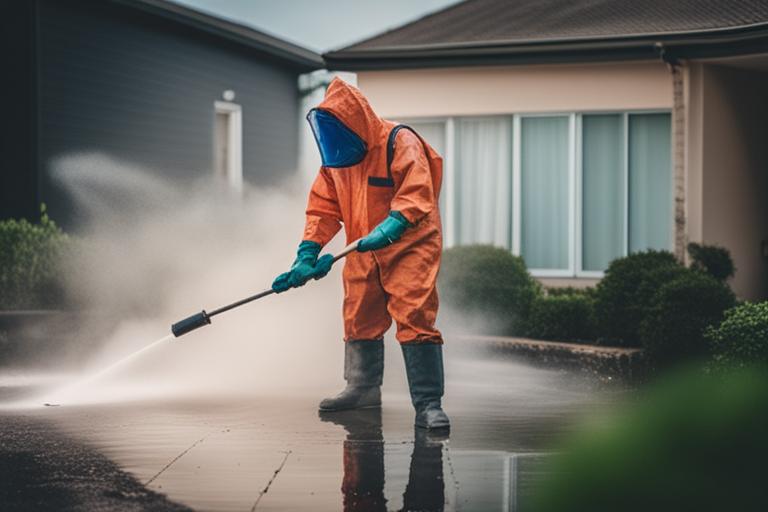
Safety Precautions When Pressure Washing with Bleach
Personal Experience: The Importance of Protecting Grass When Pressure Washing with Bleach
As a homeowner who had recently moved to a new house, I was excited to give the exterior walls and driveway a thorough cleaning. I had heard that pressure washing with bleach was an effective way to remove dirt and grime, so I decided to give it a try.
Unfortunately, I didn’t take the necessary precautions to protect the grass in my yard. As I started pressure washing, I noticed that the bleach solution was splashing onto the grass and nearby plants. I didn’t think much of it at the time, but within a few days, I noticed that the grass in those areas had turned yellow and brown.
I quickly realized that I had made a mistake by not covering the grass or watering it before pressure washing. After doing some research, I learned that bleach can be harmful to grass and other vegetation if not used properly.
I spent the next few weeks trying to revive my damaged grass by watering it regularly, fertilizing it, and cutting it to a shorter length. While some areas did eventually recover, others required reseeding and additional care.
My experience taught me the importance of taking precautions to protect grass when pressure washing with bleach. It’s crucial to cover up grass or wet it down before pressure washing to minimize the risk of bleach damage. By taking these simple steps, homeowners can enjoy a clean exterior without harming their lawn.
Importance of Safety When Using Bleach
Bleach is a powerful chemical that can be harmful if it is not used properly. It is important to take safety precautions when pressure washing with bleach to minimize the risk of injury or damage.
Tips to Stay Safe When Pressure Washing with Bleach
To stay safe when pressure washing with bleach, it is important to wear protective clothing, such as gloves and eyewear. It is also important to avoid breathing in the bleach solution and to dispose of the solution properly.
Protective Clothing and Equipment to Use When Pressure Washing with Bleach
When pressure washing with bleach, it is important to wear gloves, eye protection, and a respirator mask. These will help to protect your skin, eyes, and respiratory system from exposure to the bleach solution.
Proper Disposal of Bleach Solution
Bleach solution should be disposed of properly to minimize the risk of harm to people and the environment. It should be diluted with water and poured down a drain or flushed down a toilet.
Conclusion
Pressure washing with bleach can be harmful to grass if it is not used properly. Bleach can cause chemical burns on grass blades and roots, which can lead to permanent damage or death. While bleach is effective at cleaning outdoor surfaces, it can be harmful to the environment and can cause damage to grass and other vegetation. It is important to consider non-toxic alternatives and to take precautions to protect grass and other vegetation when pressure washing with bleach. Taking precautions to protect grass and other vegetation from bleach damage is important for maintaining a healthy and beautiful outdoor space. By following the tips and guidelines outlined in this article, you can safely pressure wash your outdoor surfaces without harming your grass.
Follow us!!